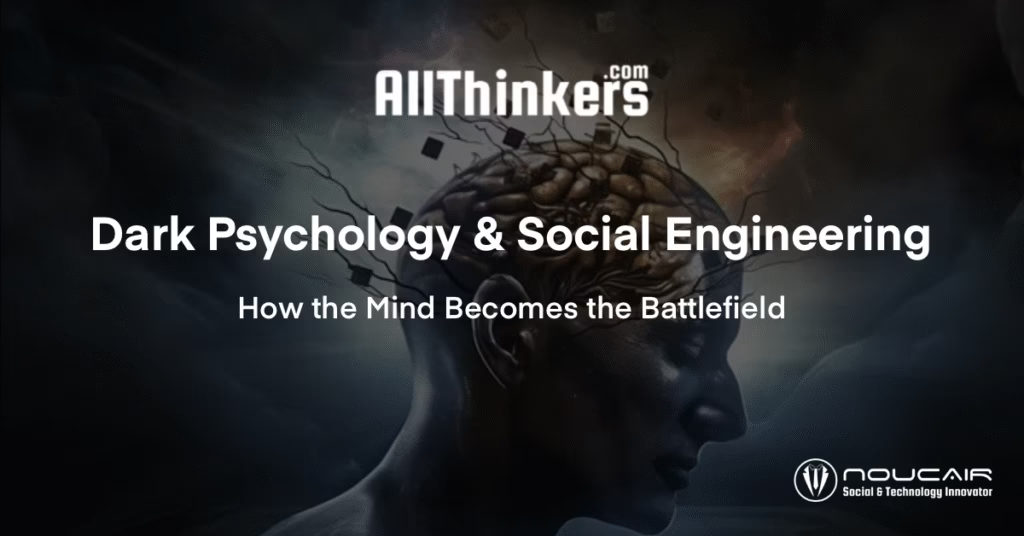The Silent War for the Mind
In our hyperconnected society, the most contested space isn’t land, money, or resources—it’s the human mind.
Our emotions, attention, and decisions are constantly influenced, shaped, and in some cases, outright controlled by forces we rarely see.
This invisible war is waged through the tools of dark psychology and social engineering—disciplines designed not to enlighten, but to manipulate.
At ALLTHINKERS, our mission is to elevate human awareness and collective intelligence. Understanding these tools is a vital step toward protecting both.
What Is Dark Psychology?
Dark psychology is the study of how people can be manipulated through their unconscious biases, emotions, and mental vulnerabilities.
Unlike positive psychology, which aims to heal and empower, dark psychology seeks to control, deceive, or influence others for selfish or strategic ends.
It draws on concepts from:
- Machiavellian manipulation
- Nar…cissistic influence
- Psy…cho…pathic cold reasoning
- Persuasion, deception, and emotional control
When applied strategically, these elements allow one to bypass critical thinking, override personal boundaries, and implant decisions without detection.
Social Engineering: Manipulation in the Real World
Social engineering is the tactical application of psychological manipulation—most often seen in digital fraud, cyberattacks, scams, and even personal relationships.
Instead of hacking systems, social engineers hack humans—by exploiting their trust, urgency, and emotional reflexes.
Examples include:
- Phishing emails impersonating a bank or service provider
- Urgent tech support scams demanding immediate access
- Job offers or romantic schemes crafted to build false rapport
- Authority impersonation in professional settings
- Fake social media personas asking for personal details
What links them all is the same principle: if you control perception, you control behavior.
The Mechanics of Manipulation: 7 Common Techniques
1. Fear
Panic and fear override logic. A threat to security, reputation, or safety compels immediate reaction.
2. Flattery
Compliments lower our guard. When someone praises us, we’re more likely to trust them—even when we shouldn’t.
3. Reciprocity
A small favor or gift can create a psychological need to return the gesture—even if it leads us into danger.
4. Social Proof
People tend to follow the crowd. If something appears popular, trusted, or accepted, we are less likely to question it.
5. Authority
We are conditioned to obey perceived authority figures. A uniform, title, or professional tone can trigger compliance.
6. Urgency
Time pressure is one of the oldest manipulation tools. The brain’s decision-making weakens when placed under stress.
7. Gaslighting
A method of psychological abuse where the manipulator distorts reality, making the victim doubt their memory, logic, or identity.
How to Defend Yourself: Building Mental Firewalls
To resist manipulation, one must train the mind like a system—alert, compartmentalized, and difficult to breach.
Pause Before Reacting
Manipulation thrives on emotion. Delay your response and let logic catch up.
Verify, Don’t Assume
Always confirm the identity of the person or source before you act, especially in digital communication.
Separate Emotion from Action
Ask yourself: “Am I being emotionally pushed into this decision?”
Observe Patterns, Not Just Words
Consistency and behavior matter more than charm or impressive words.
Control the Narrative
Own your story. Don’t let others define your goals, choices, or sense of urgency.
Compartmentalize
Separate your personal, professional, and digital identities. Don’t reuse passwords or share access across roles.
Why This Matters Now More Than Ever
We are entering an era where AI, data, and psychological profiling make manipulation easier, cheaper, and more scalable than ever before.
Whether it’s in the form of a scam, a political campaign, or a toxic relationship, the techniques of dark psychology are everywhere—and most people aren’t trained to see them.
Understanding these techniques isn’t just self-defense—it’s a step toward creating stronger minds, safer communities, and a more conscious society.
Conclusion: Think Before You Trust
The human mind is powerful, but also vulnerable.
Dark psychology exploits what we don’t question. Social engineering thrives on what we assume to be safe.
By learning how manipulation works, we don’t become para…noid—we become prepared.
At ALLTHINKERS, we believe in reclaiming mental sovereignty and promoting collective awareness.
In a world where influence is weaponized, knowledge is your first firewall.
Because the next battlefield may not be outside — but within.


